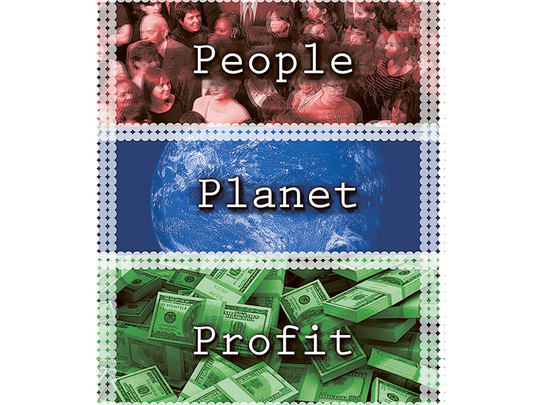
It was not very long ago that unrestrained economic growth was advocated as the panacea for all the economic and social ills in the world. It was widely held that rapid growth and free markets would create opportunities for even the poor and middle-class — vital sections that would benefit from the trickle-down of wealth.
In reality, however, hardly any wealth seeped down as the rich took the lion’s share of the economic harvest and making it crony capitalism. Today, the gap between the world’s rich and poor is wider than ever and continues to grow alarmingly. The report published by Oxfam International in January sent shock waves by revealing that wealth of the eight richest persons equals that of the poorest half in the world.
Fortunately, the world is now waking up to the fact that growth is meaningless unless it benefits people within every strata and secures the interest of future generations. Sustainable and inclusive economic growth is fast replacing unbridled profits as the new watchword for policymakers.
People, Planet, Profit — The triple bottom-line approach
The essence of the new thinking is perhaps best captured in the concept of the Triple Bottom Line (3BL), which emphasises sustainable development across three interesting dimensions: profits, planet and people. It advocates that businesses must look beyond profits, and consider equally the interests of the people and the planet.
Business success should be judged not only by the economic value added, but also by the social and environmental value achieved.
The triple bottom-line approach is thus a pragmatic shift in outlook towards solving key economic and social problems. The core premise is that taking care of society and the planet is, in fact, is great for business as well.
Putting people and planet before profit in Africa
Only recently, this core premise was brilliantly demonstrated in Africa in M-Pesa’s success story. What began in 2007 as a basic SMS-based mobile service, M-Pesa allowed Kenyans to repay their microfinance loans using their basic mobile phone. Users liked M-Pesa because it helped them reduce costs associated with handling cash and thus brought down interest rates.
Very quickly, M-Pesa became a reliable and time-efficient money-transfer platform that subsequently offered loans and saving products.
To the hundreds of millions of Africans who rely on money transfers but have no access to banks, M-Pesa came as an empowering boon. Today, almost two-thirds of adults in Kenya use M-Pesa. Moreover, the platform has been enthusiastically adopted by other countries in Africa, South Asia and Eastern Europe.
I believe that M-Pesa is a towering example of innovation because it exemplifies an important economic premise — when a business caters to society at the grass roots and provides people with sustainable solutions to elevate their quality of life — profits will surely follow.
Nearly a decade after its launch, M-Pesa has transformed economic interaction in Kenya, with 43 per cent of the nation’s GDP flowing through it. Its success reshaped Kenya’s banking and telecom sectors, extended financial inclusion for nearly 20 million Kenyans, and facilitated the creation of thousands of small businesses. M-Pesa’s success story is a truly inspiring testimony to the relevance of triple bottom-line approach.
In the UAE, major institutions such as the National Bank of Abu Dhabi have endorsed the approach, becoming signatories to the famous “Equator Principles” that urge financial institutions to stay away from financing businesses that may adversely affect people and the planet.
A vital front on which the UAE’s banks could show better 3BL focus is in lending to the SME sector, the backbone of the economy by constituting nearly 90 per cent of total business. However, the IMF report on the lending patterns of UAE banks reveals that SME funding accounts for a minuscule 4 per cent of the total.
The report also states that 77 per cent of SMEs have no formal access to finance. To empower the sector in its entirety, banks should reorient their lending practices and focus on long-term sustainability rather than on short-term risks. The UAE regulators should also introduce compulsory sustainability reporting for all large and publicly listed companies.
In closing, I am reminded of the wisdom in a Greek proverb which says “a society grows great when old men plant trees whose shade they know they shall never sit in.” In this spirit, let us operate our businesses in a way that puts people and planet before profits, so that our children may enjoy such shade — and fruit — in bounteous plenty.
The writer is a member of faculty at the Emirates Institute for Banking & Financial Studies.












